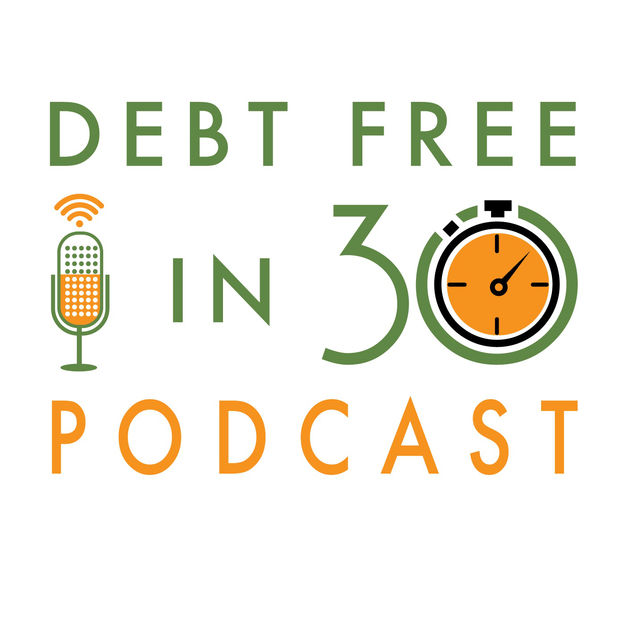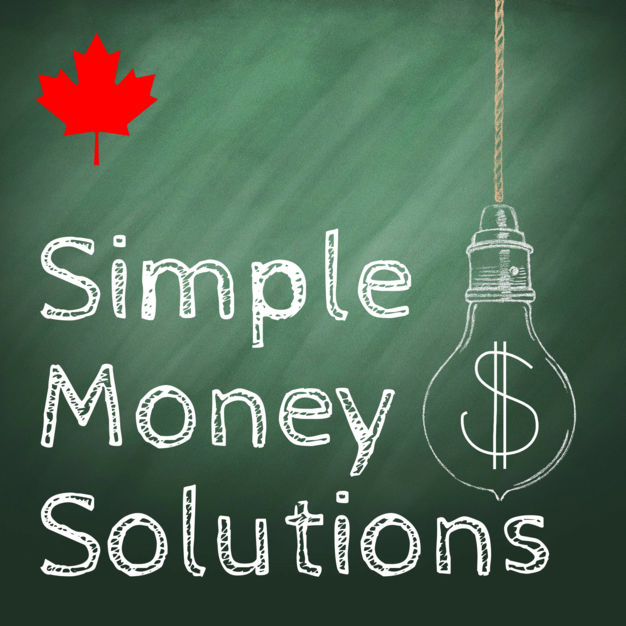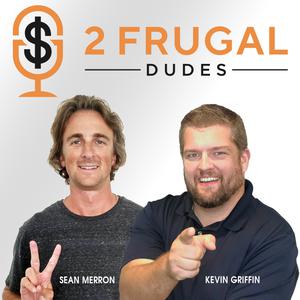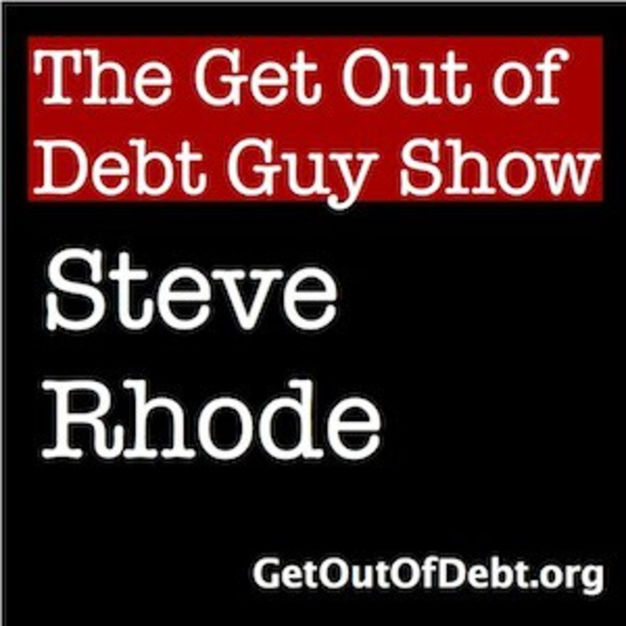
Debt Free in 30
Doug Hoyes
Each week Doug Hoyes talks to industry experts about debt, money, and personal finance. Don't be confused; listen as the guest experts cut through the jargon and share practical advice.
- 29 minutes 34 seconds542 – The Truth of Credit Card Rewards – They're Costing You
Are credit card points and rewards as beneficial as they seem, or are they secretly costing you more than you realize?
Doug Hoyes and Ted Michalos discuss the truths behind credit card reward systems, revealing how spending habits, annual fees, and high-interest cards may affect your financial health. Learn how credit card companies use your data, the psychology behind reward marketing, and whether these points and rewards are worth it in the long run. (0:50) – Have you changed your spending habits to earn credit card rewards? (1:45) – The history of credit card rewards: How they started and why they’re popular. (5:45) – What personal data do credit card companies collect from you? (8:00) – How credit card companies market rewards and why we’re drawn to them. (10:45) – The biggest downside of credit card rewards (12:55) – Doug and Ted's advice: How many credit cards should you really have? (14:30) – Why using high-interest cards can lead to risky financial situations. (18:20) – How credit card usage affects your credit score: Tips to avoid negative impacts. (22:30) – The overlooked cost of annual fees (26:00) – The risk of losing your points during insolvency: Use them, or lose them. (27:00) – Expert advice on credit card rewards Learn more from Hoyes Michalos: What Happens to Points If You Go Bankrupt? Pros and Cons of Preapproved Limit Increase Unpaid Credit Card Consequences Debt Repayment Calculator Debt To Income Ratio Calculator FREE Credit Rebuilding Course Sign Up for Our Newsletter HERE https://www.hoyes.com/subscribe-newsletter/ Watch the Hoyes Michalos YouTube Channel Hoyes Michalos Instagram Hoyes Michalos Facebook Hoyes Michalos TikTok Hoyes Michalos Twitter (X) Hoyes Michalos LinkedIn Straight Talk on Your Money by Doug Hoyes Find a Hoyes Michalos Office in Your Area Here
Disclaimer: The information provided in the Debt Free in 30 Podcast is for entertainment and informational purposes only and is not intended as personal financial advice. Individual financial situations vary and may require personalized advice from a qualified financial advisor. Always consult with a financial professional. The views expressed in this episode do not necessarily reflect the opinions of Hoyes, Michalos & Associates, or any other affiliated organizations. We do not endorse or guarantee the effectiveness of any specific financial institutions or strategies discussed.
18 January 2025, 10:00 am - 31 minutes 5 seconds541 – A House Is Not an Investment If You Can’t Afford It
Real estate is often seen as the ultimate investment, but is it really?
Doug and Ted discuss the financial realities of homeownership, from the hidden costs of maintenance and repairs to the risks of negative equity, pre-con agreements, and even becoming a landlord.
This episode explains why a house may not always be the wealth-building asset it’s made out to be—especially if it’s beyond your financial reach.
(2:00) – What exactly qualifies as an investment? (3:45) – Liquidity and diversification: why they matter (6:00) – Doug’s take: a house is a consumer good, not an investment (10:00) – Why owning a home is often more expensive than renting (13:30) – The forced savings argument: does it hold up? (15:00) – Negative equity and the risks of market downturns (16:10) – Preconstruction agreements and the challenges they could bring in 2025 (18:20) – The overlooked costs of maintenance and repairs (24:15) – Forced holding: why homeownership limits your flexibility (25:45) – Renting out your home doesn’t automatically make it a profitable investment (27:20) – Ted’s perspective: is owning a house truly an investment? Learn more from Hoyes Michalos: What Happens If You Miss A Mortgage Payment? Will A Second Mortgage Clean Up Your Debts? What To Do If You Can’t Pay Deferred Mortgage Payments Debt Repayment Calculator Debt To Income Ratio Calculator FREE Credit Rebuilding Course Sign Up for Our Newsletter HERE Hoyes Michalos YouTube Channel Hoyes Michalos Instagram Hoyes Michalos Facebook Hoyes Michalos TikTok Hoyes Michalos Twitter (X) Hoyes Michalos LinkedIn Straight Talk on Your Money by Doug Hoyes Find a Hoyes Michalos Office in Your Area Here Disclaimer: The information provided in the Debt Free in 30 Podcast is for entertainment and informational purposes only and is not intended as personal financial advice. Individual financial situations vary and may require personalized advice from a qualified financial advisor. Always consult with a financial professional. The views expressed in this episode do not necessarily reflect the opinions of Hoyes, Michalos & Associates, or any other affiliated organizations. We do not endorse or guarantee the effectiveness of any specific financial institutions or strategies discussed.
11 January 2025, 10:00 am - 31 minutes 48 seconds540 – How the New Criminal Interest Rate Affects You
It’s crucial to stay informed about the recent revision to the criminal interest rate cap, effective January 1, 2025. How will Canadians be impacted? Doug and Ted provide insight into potential lending trends, emerging marketing tactics, unintended consequences, and how this change will impact the most vulnerable borrowers and secondary lenders in the future.
Timestamps:
(0:30) – Short explanation of the Criminal Interest Rate
(2:40) – What is changing, and who does it impact?
(3:30) – Payday Loans and Vulnerable Borrowers
(9:20) – “Net Charge Off Rate” a rationale for high interest
(12:30) – The “dubious speculation part of the show that is not based on fact”
(14:00) - Unintended consequences – predatory lenders pivoting
(18:30) – Secondary lenders diversifying product lines? To what?
(21:00) – Microloans, Insurance, Rent to Own, and more
(28:00) – Heads up for new marketing tactics – Buyer Beware
Learn more from Hoyes Michalos:
Episode 491 of DFI30 (Thorough Background of Criminal Interest Rate)
Payday Loan in Collection? What To Do Next
Debt Repayment Calculator Debt To Income Ratio Calculator FREE Credit Rebuilding Course Sign Up for Our Newsletter HERE Hoyes Michalos YouTube Channel Hoyes Michalos Instagram Hoyes Michalos Facebook Hoyes Michalos TikTok Hoyes Michalos Twitter (X) Hoyes Michalos LinkedIn Straight Talk on Your Money by Doug Hoyes Find a Hoyes Michalos Office in Your Area Here
Disclaimer: The information provided in the Debt Free in 30 Podcast is for entertainment and informational purposes only and is not intended as personal financial advice. Individual financial situations vary and may require personalized advice from a qualified financial advisor. Always consult with a financial professional. The views expressed in this episode do not necessarily reflect the opinions of Hoyes, Michalos & Associates, or any other affiliated organizations. We do not endorse or guarantee the effectiveness of any specific financial institutions or strategies discussed.
4 January 2025, 10:30 am - 31 minutes 37 seconds539 – Canadian Insolvency and Economic Trends in 2025
As 2024 comes to an end, Doug Hoyes and Ted Michalos revisit their past predictions to see what they nailed—and what surprised them.
They cover everything from inflation and insolvency to unemployment and real estate and, using the latest economic data and trends, share their evidence-based predictions for 2025. Do you agree with Doug and Ted, or do you have a different perspective to share? Let us know in the comments!
Timestamps:
(2:00) – Doug and Ted’s 2024 predictions on inflation
(6:00) – Insolvency trends and forecasts from 2024
(10:00) – Returning to pre-pandemic insolvency numbers and trending upward
(10:50) – Discussion on unemployment rates
(14:20) – A closer look at rising credit card debt
(15:15) – Real estate, homeownership, and pre-construction agreements
(19:00) – Is Canada in a recession? Examining GDP trends
(23:00) – Doug’s take: Why Canada is already in a recession
(24:00) – Predictions for 2025 in key economic areas
(26:00) – Wildcard topic: Should Canada be concerned about tariffs?
(27:00) – Insolvency Predictions for 2025
Learn more from Hoyes Michalos: Debt Repayment Calculator Debt To Income Ratio Calculator FREE Credit Rebuilding Course Sign Up for Our Newsletter HERE Hoyes Michalos YouTube Channel Hoyes Michalos Instagram Hoyes Michalos Facebook Hoyes Michalos TikTok Hoyes Michalos Twitter (X) Hoyes Michalos LinkedIn Straight Talk on Your Money by Doug Hoyes Find a Hoyes Michalos Office in Your Area Here
Disclaimer: The information provided in the Debt Free in 30 Podcast is for entertainment and informational purposes only and is not intended as personal financial advice. Individual financial situations vary and may require personalized advice from a qualified financial advisor. Always consult with a financial professional. The views expressed in this episode do not necessarily reflect the opinions of Hoyes, Michalos & Associates, or any other affiliated organizations. We do not endorse or guarantee the effectiveness of any specific financial institutions or strategies discussed.
2 January 2025, 8:00 pm - 31 minutes 44 seconds538 – Financial Caregiving: Taking Care of Aging Parents While Tackling Debt
How do you balance financial well-being with the responsibility of supporting aging parents?
This important episode tackles the complexities of financial caregiving, highlighting the challenges of the "sandwich generation"—those caring for both children and elderly parents—all while managing personal debt.
Doug and Ted cover the pros and cons, from government benefits to taxes to practical steps for initiating conversations with your parents; you’ll learn essential tools and strategies for confidently navigating financial caregiving.
Timestamps:
(0:40) – What’s the Average Age for Insolvency? (2:00) – Understanding the “Sandwich” Generation: Caught Between Debt and Aging Parents (5:00) – Financial Caregiving Explained: What Does It Entail? (8:00) – Should You Prioritize Paying Off Debt or Helping Your Parents? (9:45) – Sidebar: Why Ted Hates Reverse Mortgages (14:00) – Government and Community Benefits for Caregivers and Their Aging Parents (16:00) – The Impacts and Downsides of Financial Caregiving (19:20) – Why Filing Taxes Is Crucial for Caregivers (22:30) – Making Tough Decisions on Behalf of Your Parents (24:00) – Practical Advice: Preparing for Financial Caregiving (28:00) – How to Start the Money Conversation with Your Parents
Learn more from Hoyes Michalos: Cosigned Debt in a Consumer Proposal Power of Attorney – Can I Deal With My Parents Debts? Debt Repayment Calculator Debt To Income Ratio Calculator FREE Credit Rebuilding Course Sign Up for Our Newsletter HERE Hoyes Michalos YouTube Channel Hoyes Michalos Instagram Hoyes Michalos Facebook Hoyes Michalos TikTok Hoyes Michalos Twitter (X) Hoyes Michalos LinkedIn Straight Talk on Your Money by Doug Hoyes Find a Hoyes Michalos Office in Your Area Here
Disclaimer: The information provided in the Debt Free in 30 Podcast is for entertainment and informational purposes only and is not intended as personal financial advice. Individual financial situations vary and may require personalized advice from a qualified financial advisor. Always consult with a financial professional. The views expressed in this episode do not necessarily reflect the opinions of Hoyes, Michalos & Associates, or any other affiliated organizations. We do not endorse or guarantee the effectiveness of any specific financial institutions or strategies discussed.
21 December 2024, 10:00 am - 31 minutes 36 seconds537 – The True Cost of Borrowing
Have you ever stopped to consider the real costs—and sacrifices—of borrowing someone else’s money?
Whether it’s a mortgage, car loan, or another form of financing, the hidden fees, penalties, and long-term credit impacts can quickly add up. Beyond the numbers, debt can bring stress, limit opportunities, and force tough choices in your personal and professional life.
Doug Hoyes and Ted Michalos provide expert insights to help you confidently navigate borrowing, avoid costly mistakes, and make decisions that protect your finances and peace of mind.
Timestamps:
(1:00) – Get Interested in Your Interest Rates
(3:25) – Understanding Origination Fees and Insurance Costs
(8:05) – Why Doug and Ted Recommend Paying on Time
(10:15) – Prepayment Penalties and Other “Hidden” Fees
(15:10) – Discretionary Spending or Needing to Borrow More
(17:10) – How Borrowing Impacts Your Credit Score
(19:30) – Debt Causes Stress and Limits Opportunities
(21:15) – Why Banks Encourage You to Finance
(24:00) – Practical Advice – How to Read Your Loan Contract
(26:50) – The Bottom Line: Calculating the Total Cost
(29:00) – Knowing When to Seek Professional Help
Learn more from Hoyes Michalos: Debt Repayment Calculator Debt To Income Ratio Calculator Budgeting Course Sign Up for Our Newsletter HERE Smart Borrowing and Loan Management Tips Hoyes Michalos YouTube Channel Hoyes Michalos Instagram Hoyes Michalos Facebook Hoyes Michalos TikTok Hoyes Michalos Twitter (X) Hoyes Michalos LinkedIn Straight Talk on Your Money by Doug Hoyes Find a Hoyes Michalos Office in Your Area Here Disclaimer: The information provided in the Debt Free in 30 Podcast is for entertainment and informational purposes only and is not intended as personal financial advice. Individual financial situations vary and may require personalized advice from a qualified financial advisor. Always consult with a financial professional. The views expressed in this episode do not necessarily reflect the opinions of Hoyes, Michalos & Associates, or any other affiliated organizations. We do not endorse or guarantee the effectiveness of any specific financial institutions or strategies discussed.
14 December 2024, 10:10 am - 31 minutes 38 seconds536 – How to Handle Maxed-Out Credit Cards
Is the thought of maxed-out credit cards keeping you up at night? This guide unpacks the pitfalls of credit card debt and offers clear strategies to break free from the cycle.
Doug Hoyes and Ted Michalos discuss why your credit utilization rate matters, how many credit cards you should really have, the pros (but mostly cons) of opening new credit accounts, and the best options when you’re in a pinch.
(1:45) – What’s the problem with maxing out your credit cards?
(4:00) – How a credit card should be used (cash substitute vs. borrowing tool)
(5:00) – Credit limit, available credit, and utilization rate – what’s the difference?
(7:00) – Strategies for a maxed-out situation: Short-term fixes that work.
(8:45) – Taking out additional credit cards: A double-edged sword.
(11:15) – Should you have one or two credit cards? More?
(14:30) – Signs your financial situation is serious: When to seek help.
(16:15) – Practical advice for maxed-out cards
(19:30) – The downside of debt consolidation loans
(23:40) – Can calling your bank help? Exploring referral programs and renegotiation.
(27:00) – Consumer proposals explained: Why creditors accept less payment.
Learn more from Hoyes Michalos: Budgeting Course Sign Up for Our Newsletter HERE Should You Pay Credit Card Debt With Another Credit Card? Hoyes Michalos YouTube Channel Hoyes Michalos Instagram Hoyes Michalos Facebook Hoyes Michalos TikTok Hoyes Michalos Twitter (X) Hoyes Michalos LinkedIn Straight Talk on Your Money by Doug Hoyes Find a Hoyes Michalos Office in Your Area Here
Disclaimer: The information provided in the Debt Free in 30 Podcast is for entertainment and informational purposes only and is not intended as personal financial advice. Individual financial situations vary and may require personalized advice from a qualified financial advisor. Always consult with a financial professional. The views expressed in this episode do not necessarily reflect the opinions of Hoyes, Michalos & Associates, or any other affiliated organizations. We do not endorse or guarantee the effectiveness of any specific financial institutions or strategies discussed.
7 December 2024, 10:05 am - 30 minutes 39 seconds535 – How Seasonal Workers Can Manage Income and Debt
Many Canadians have seasonal employment or variable income, making financial planning more complex.
Doug Hoyes and Ted Michalos provide practical strategies for managing income fluctuations, saving effectively, dealing with debt, and handling taxes during off-seasons.
This episode is a must-listen for anyone navigating seasonal employment or variable income.
Timestamps:
(2:00) – The Seasonality of Jobs: Challenges for Canadian workers
(4:00) – Saving Money: Why it’s easier said than done
(6:45) – Financial Planning: Why every seasonal worker needs a plan
(8:50) – E.I. Eligibility in Canada: Can you qualify during the off-season?
(10:00) – Emergency Funds: Essential for seasonal employment stability
(12:15) – Boosting Income: ways to earn extra during off-seasons.
(15:20) – Strategic Use of Credit Cards
(16:30) – Pay Off Debt or Invest? How to prioritize your money
(19:00) – Smart Savings: Where to put your money
(22:00) – Taxes for Seasonal and Self-Employed Canadians: What to know
(25:00) – Staying Flexible: Preparing for life’s financial uncertainties
Learn more from Hoyes Michalos: Managing Money on a Variable Income First-time Home Buyer Podcast Credit Rebuilding Course Sign Up for Our Newsletter HERE Hoyes Michalos YouTube Channel Hoyes Michalos Instagram Hoyes Michalos Facebook Hoyes Michalos TikTok Hoyes Michalos Twitter (X) Hoyes Michalos LinkedIn Straight Talk on Your Money by Doug Hoyes Find a Hoyes Michalos Office in Your Area Here
Disclaimer: The information provided in the Debt Free in 30 Podcast is for entertainment and informational purposes only and is not intended as personal financial advice. Individual financial situations vary and may require personalized advice from a qualified financial advisor. Always consult with a financial professional. The views expressed in this episode do not necessarily reflect the opinions of Hoyes, Michalos & Associates, or any other affiliated organizations. We do not endorse or guarantee the effectiveness of any specific financial institutions or strategies discussed.
30 November 2024, 10:00 am - 32 minutes 45 seconds534 – How to Stay Motivated While Paying Off Debt
Struggling to stay motivated while repaying debt? You're not alone!
Charlie Kovacs, BIA Insolvency Counselor with Hoyes Michalos, joins Debt Free in 30 to share practical strategies to help you stay focused, celebrate small victories, and shift your mindset from guilt to empowerment.
Whether juggling student loans, tackling "life quakes," or just figuring out how to prioritize debt, this episode offers expert advice to keep you on track. Sign up for the monthly Debt Free Digest HERE
Hoyes Michalos Instagram Hoyes Michalos Facebook Hoyes Michalos TikTok Hoyes Michalos Twitter (X) Hoyes Michalos LinkedIn
Timestamps
(2:50) – Is Tracking Progress Essential for Debt Repayment?
(4:30) – The Power of Small, Daily Financial Decisions
(5:40) – How Often Should You Review Your Progress?
(6:40) – Celebrating Wins: The Role of Little Rewards
(8:30) – Ontario Student Loans: Current Trends
(10:15) – Prioritizing Debt: Revolving vs. Installment Loans
(11:20) – Life Quakes: Handling Major Financial Disruptions
(15:30) – How a Financial Professional Can Transform Your Debt Journey
(18:20) – Support Systems: Friends and Family's Impact on Motivation
(20:50) – Shifting Your Financial Mindset
(25:00) – Your Emergency Fund’s Purpose
(28:30) – Practical Advice for Tracking Progress
Should I Pay Off a Credit Card with a Credit Card? Can You Be Forced into Involuntary Bankruptcy? Straight Talk on Your Money by Doug Hoyes
Hoyes Michalos Blog Find a Hoyes Michalos Office in Your Area Here
Disclaimer: The information provided in the Debt Free in 30 Podcast is for entertainment and informational purposes only and is not intended as personal financial advice. Individual financial situations vary and may require personalized advice from a qualified financial advisor. Always consult with a financial professional. The views expressed in this episode do not necessarily reflect the opinions of Hoyes, Michalos & Associates, or any other affiliated organizations. We do not endorse or guarantee the effectiveness of any specific financial institutions or strategies discussed.
23 November 2024, 10:00 am - 36 minutes 39 seconds533 – What Happens If You Can’t Pay Your Mortgage – Feat. Scott Terrio
If you’re a homeowner in Canada, you can’t miss this episode! Canadian homeowners are increasingly facing the tough reality of missed payments and rising financial pressures.
Licensed Insolvency Trustee Scott Terrio joins Debt Free in 30 to unpack the potential warning signs of mortgage trouble, troubleshoot possible solutions, and provides guidance on how to handle worst-case scenarios.
Timestamps:
(1:25) – Canada is at the beginning of a mortgage crisis
(3:50) – Early warning signs of potential mortgage struggles
(8:30) – What to do if you think you might miss a payment
(11:00) – Mortgage deferral programs: How they work
(12:40) – Refinancing or modification of your mortgage
(15:00) – HELOCs (Home Equity Line of Credit)
(17:15) – Selling your house: An extreme or smart option?
(23:15) – If you miss one payment what exactly happens?
(25:45) – Consequences of missing multiple payments
(27:45) – Worst-case scenario: How it unfolds
(28:55) – Can you buy a home again if you lose your current one?
(32:30) – Why an insolvency proceeding might be a good idea
We release new content every weekday! Follow our socials for funny podcast clips, money management tips, Q+A, and more! Hoyes Michalos Instagram Hoyes Michalos Facebook Hoyes Michalos TikTok Hoyes Michalos Twitter (X) Hoyes Michalos LinkedIn Sign Up for Our Newsletter HERE
What Happens If You Miss a Mortgage Payment? Find a Hoyes Michalos Office in Your Area Here
Disclaimer: The information provided in the Debt Free in 30 Podcast is for entertainment and informational purposes only and is not intended as personal financial advice. Individual financial situations vary and may require personalized advice from a qualified financial advisor. Always consult with a financial professional. The views expressed in this episode do not necessarily reflect the opinions of Hoyes, Michalos & Associates, or any other affiliated organizations. We do not endorse or guarantee the effectiveness of any specific financial institutions or strategies discussed.
16 November 2024, 10:00 am - 30 minutes 17 seconds532 – Financial Fitness Check: How to Assess Your Financial Health
How do you know if you're financially fit?
Doug Hoyes and Ted Michalos break down the essentials of financial "fitness", covering the importance (or unimportance) of positive net worth, stable cash flow, emergency funds, retirement planning, life insurance, budgeting, and more. This episode is packed with expert insights to help you evaluate your financial health and make informed decisions for a financially “fit” future.
Timestamps:
(0:45) – Ted Michalos on Financial Literacy Month
(2:00) – What does it mean to be financially "fit"?
(3:35) – Defining positive net worth and positive cash flow, which is more important?
(7:30) – Example of a cash flow analysis
(9:10) – The importance of an emergency fund (do you need one?)
(12:00) – Is a retirement plan essential?
(14:30) – Financial jargon sounds complex – Doug and Ted keep it practical
(16:00) – Do you need a budget or any financial plan at all?
(21:30) – Setting a savings goal: Why it matters
(24:30) – Life insurance and financial security
(25:00) – Final financial literacy advice from Doug and Ted
We release new content every weekday! Follow our socials for funny podcast clips, money management tips, Q+A, and more! Hoyes Michalos InstagramHoyes Michalos Facebook Hoyes Michalos TikTok Hoyes Michalos Twitter (X) Hoyes Michalos LinkedIn Episode Links Why Budgets Fail and How to Succeed Straight Talk on Your Money by Doug Hoyes Hoyes Michalos Blog Find a Hoyes Michalos Office in Your Area Here
Disclaimer: The information provided in the Debt Free in 30 Podcast is for entertainment and informational purposes only and is not intended as personal financial advice. Individual financial situations vary and may require personalized advice from a qualified financial advisor. Always consult with a financial professional. The views expressed in this episode do not necessarily reflect the opinions of Hoyes, Michalos & Associates, or any other affiliated organizations. We do not endorse or guarantee the effectiveness of any specific financial institutions or strategies discussed.
9 November 2024, 10:00 am - More Episodes? Get the App
Your feedback is valuable to us. Should you encounter any bugs, glitches, lack of functionality or other problems, please email us on [email protected] or join Moon.FM Telegram Group where you can talk directly to the dev team who are happy to answer any queries.
 Midday Money Show
Midday Money Show
 Simple Money Solutions: Personal Finance Canada, Personal Finance from a Canadian Perspective, Financial Independence, Lifest
Simple Money Solutions: Personal Finance Canada, Personal Finance from a Canadian Perspective, Financial Independence, Lifest
 2 Frugal Dudes
2 Frugal Dudes
 Follow Me out of Debt | Get out of debt and get into prosperity!
Follow Me out of Debt | Get out of debt and get into prosperity!
 Get Out of Debt Guy Show
Get Out of Debt Guy Show
 Money Plan SOS
Money Plan SOS